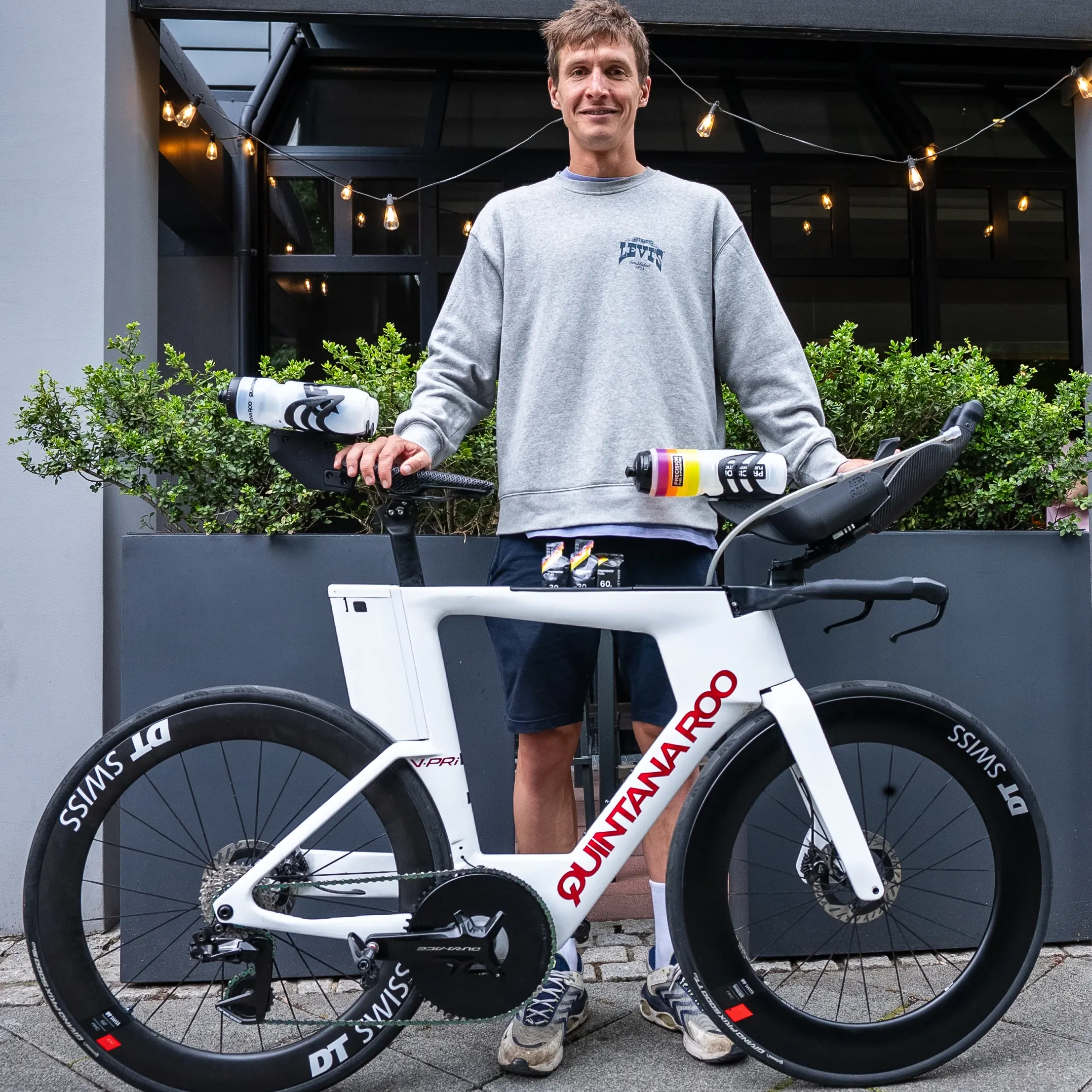
Kristian Høgenhaug
IRONMAN® Frankfurt
Kristian's headline numbers
Kristian's strategy
Fueling
Carbohydrate is the main fuel you burn when racing. Failing to fuel properly is a leading cause of underperformance in longer races.
Kristian managed to consume an impressive rate of carbs across both the bike (~169g/h) and the run (~121g/h) at the IRONMAN® European Championships. This placed him well beyond the general recommendations for endurance athletes (60-90g/h); however, elite athletes who can sustain very high rates of energy expenditure and fuel utilisation are finding that they can tolerate and appear to benefit from such high intakes, which may help to maintain their incredible performances.
Based on his physiological testing, sustaining an average of 319W for 3 hours 52 minutes would require Kristian to burn ~198g of carbohydrate per hour. At the start, he would have ~600g of carb stored from carb loading, but these finite reserves deplete steadily during prolonged, race-pace efforts. Despite this, as the race progresses, carbohydrates remain the primary and fuel source for endurance performance, so to keep his stores topped up and maintain high output, Kristian targeted an impressive ~169g/h of carb on the bike, primarily from drink mixes, supplemented with a PF 60 Chew Bar and a PF 30 Gel to add variety in flavour and texture profile.
Hydration
Taking on board an appropriate amount of fluid and sodium is essential to maintaining blood volume and supporting the cardiovascular effort needed to perform on race day.
Whilst the absolute amount of sodium and fluid consumed per hour is important, it’s critical to consider these in relation to each other. This is known as 'relative sodium concentration' and it’s expressed in milligrams per litre (mg/L). How much sodium you’re taking in per litre of fluid is more important than the absolute amount taken in per hour.
Sweat sodium concentration (mg/L) is largely genetically determined and remains relatively stable. Knowing how salty your sweat is enables you to replace a good proportion of your sweat losses, which can range from 200-2,000mg/L.
Whilst Kristian’s losses are on the moderate side, getting his hydration strategy right is still crucial when it’s hot and/or humid as his higher sweat rate in these conditions can result in significant net losses over the duration of a race.
Learn moreAfter coming on board with PF&H, Kristian decided to increase his sodium intake to better match his known sweat sodium concentration of 860mg/L. This was the first warmer race of the season where he could test out this new strategy, and it appeared to work well for him in the hot conditions in Frankfurt. Kristian averaged an impressive fluid intake of 1525ml/h on the bike and 885ml/h on the run, which likely supported his hydration status well on the day, as he would have replaced a high proportion of his sweat losses, ~80% on the bike, meaning that he could start the marathon in a well-hydrated state. Kristain took on his sodium through PF Carb & Electrolyte Drink Mix on the bike, along with Electrolyte Capsules. The success of this strategy reflects well-established hydration principles that encourage replacing sodium to match sweat losses in prolonged, hot events.
Caffeine
Beyond the Three Levers of Performance (carb, sodium and fluid), caffeine is one of only a few substances that is proven to improve performance for most endurance athletes as it can help stave off mental and physical fatigue.
Kristian hit a total of 400mg and 5.2mg/kg of caffeine, an amount shown to enhance endurance exercise performance. Some athletes in extended endurance events, such as IRONMAN®, may reach doses exceeding 6mg/kg because they aim to maintain circulating caffeine at the desired levels in the blood, which tips them over the 6mg/kg mark but over a prolonged duration. In this race, however, Kristian opted to limit his caffeine intake and not push the amount too high. He chose to do this as there is some emerging evidence that suggests caffeine may negatively impact cycling performance and thermoregulation in the heat. However, since this evidence is still limited, the best advice, at present, is to be sensible with caffeine intake in the heat and not push your limits, like Kristian did here.
How Kristian hit his numbers
Here's everything that Kristian ate and drank on the day...
Kristian's weapons of choice
Final thoughts
Kristian's full stats
Data Confidence?
There is an adequate level of accuracy in the data collected and the numbers reported. The athlete manages to recall what they ate and drank including most specifics (brands flavours quantities plausible estimations of volumes). However there are estimations made within the data which affect the overall confidence level in the data reported.